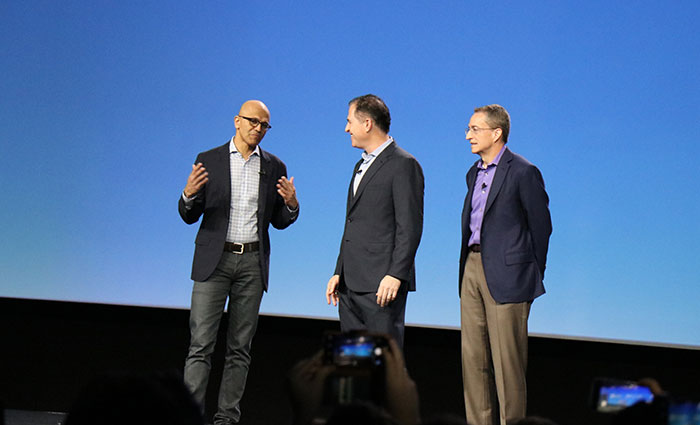Dell And Microsoft Announce Azure VMware Solutions Hybrid Cloud Partnership
Dell and Microsoft announced today that the two companies are burying the hatchet with respect to previous virtualization squabbles, and have inked an “expanded partnership” with their respective VMware and Azure platforms. Called Azure VMware Solutions, customers will now be able to run and manage fully supported VMware workloads on Azure.
On stage at Dell Technologies World in Las Vegas today, Microsoft CEO Satya Nadella, Dell CEO Michael Dell and VMware CEO Pat Gelsinger discussed how these native deployments “[enable] organizations to tap into Azure’s massive scale, security, and fast provisioning cycles to innovate and modernize applications while improving performance.”

It’s just as important to mention that customer will be able to leverage their established toolsets for VMware instances including VMware vSphere, vSAN, NSX, and vCenter. This hybrid cloud framework is becoming more popular these days as corporations are reluctant to rely on just a single outside firm to handle all of their private- and public-facing infrastructure. It is also in many cases more cost-effective to go this dual-sourced route.

"VMware workloads on Azure can be easily modernized via integration with a broad range of Azure services such as Azure Active Directory, Azure AI and IoT enabling new, intelligent experiences," writes Scott Guthrie, Microsoft's EVP for the Cloud and Enterprise Group. "Customers can also take advantage of unmatched Azure pricing and benefits for Windows Server and SQL Server hosted on Azure VMware Solutions including Azure Hybrid Benefits and free Extended Security Updates."
In addition, the VMware Workspace ONE management platform is now coming to Microsoft 365. This will give Workspace ONE customers the ability to take advantage of Office 365 features thanks to Microsoft Intune and Azure Active Directory Premium integration.
It should be noted that VMware entered into a similar hybrid cloud agreement with Amazon and its Amazon Web Services (AWS) platform back in 2016.


